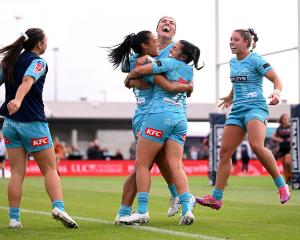
Sanzar had agreed earlier this month to include an extra team in the competition, bringing team numbers to 15, and to have a conference series and extended play-offs.
This was thought to have New Zealand-based teams playing each other twice, both home and away annually, and then playing all other teams once. There would then be a six-team play-off series, and the competition would run for about 22 weeks.
But South Africa has thrown doubts on those plans, saying its domestic competition, the Currie Cup, cannot be moved from its July start, and it wants its international players to participate in this competition.
It suggested to fit everything in, including the June internationals against northern hemisphere teams, the competition should start in January.
But Australia and New Zealand do not want the competition to start until March, at the earliest.
Reid said unions were trying to position themselves to protect their interests and there was "plenty of water to go under the bridge yet".
The three Sanzar partners had until the end of June to present the organisation's proposal to News Corporation, its broadcasting partner.
Reid said a compromise was likely but no-one would turn up if the season started in January.
South Africa's position could be compared to India in cricket, as it provided the bulk of the money and so wanted to have a bigger say, Reid said.
Reid said March 1 would be the earliest the season should start, and said last weekend's game in Invercargill had the right feel to it, with the weather cooler and a good crowd.
He had plenty of confidence in New Zealand Rugby Union staff dealing with the matters.
NZRU officials would travel to South Africa today to discuss matters.
South Africa has sold its television rights for the Currie Cup from 2011 until 2015 and did not want to water down that competition.
New Zealand Rugby Union chief executive Steve Tew said New Zealand could sympathise with South Africa wanting to protect its domestic game.
"But we are trying to negotiate some middle ground and will continue to play that role," Tew said.
South African Rugby Union (Saru) acting chief executive Andy Marinos said it had rejected a New Zealand-Australia vision of a "Pacific solution".
Faced with what seemed an implacable South Africa, the two Anzac partners had begun investigating setting up a transtasman competition, also involving teams from the South Pacific and Japan, to begin in 2011.
Only towards the end of this competition would South Africa become involved, with its leading sides playing off against the top teams in the Australian and New Zealand conference for the Super rugby title.
"I don't think playing in a championship final between Australasia and South Africa would be attractive to SA broadcasters or the SA public," Marinos told The Australian newspaper.
That left two choices: for South Africa to go it alone, and perhaps play in a European competition; or for the Sanzar partners to cool down and reach a compromise.
Marinos is advocating the latter, insisting a compromise could be reached on all the major sticking points.
"I wouldn't necessarily view it [an impasse] in that dramatic a light.
"What we've clearly got is three countries that have very different backyards and very different competition structures that they've been dealing with, and it's never easy to get it to sync into one happy format.
"South Africa isn't going to be capitulating. But from a South African perspective, we're going to work as hard as we can to reach some real middle ground," Marinos said.












